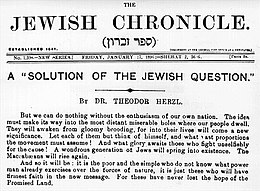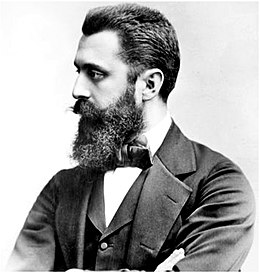চিয়োনবাদ


চিয়োনবাদ (হিব্ৰু: צִיּוֹנוּת Tsiyyonut; আৰবী: صهيونية; গ্ৰীক: Σιωνισμός sionismós; ইংৰাজী: Zionism) হ’ল যিহূদীসকলৰ এটা মতাদৰ্শ[1][2][3] আৰু জাতীয়তাবাদী[টোকা 1] আন্দোলন যিটো মোটামুটিভাৱে কনান, প্ৰতিজ্ঞাত দেশ, পৱিত্ৰ দেশ, ইস্ৰায়েল দেশ অথবা ফিলিস্তিন অঞ্চলক কেন্দ্ৰ কৰি এটি যিহূদী ৰাষ্ট্ৰ পুনঃপ্ৰতিষ্ঠা আৰু পৃষ্ঠপোষকতাক সমৰ্থন কৰে।[6][7][8][9][10][11] আধুনিক চিয়োনবাদ ১৯শ শতিকাৰ শেষফালে মধ্য আৰু পূব ইউৰোপলৈ এটি জাতীয় পুনৰজাগৰণ আন্দোলন হিচাপে—যিহূদী বিদ্বেষৰ নৱতৰঙ্গ এবং হাস্কালা বা যিহূদী আলোকায়ন উভয়ৰ প্ৰতিক্ৰিয়াস্বৰূপ—উদ্ভূত হৈছিল।[12][13][14] এৰ পিছত আন্দোলনৰ বেছিৰভাগ নেতা ফিলিস্তিনত কাংক্ষিত ৰাষ্ট্ৰ স্থাপনৰ সৈতে মূল লক্ষ্যটিক জড়িত কৰিছিল, তৎকালীন সময়ত যে অঞ্চলটো উছমানীয় সাম্ৰাজ্যৰ নিয়ন্ত্ৰণত আছিল।[15][16][17]
ইস্ৰায়েল প্ৰতিষ্ঠাৰ পিছৰ পৰা চিয়োনবাদী আন্দোলন যিহূদী ৰাষ্ট্ৰৰ পক্ষলৈ কথা কৈ আহিছে। কিছু কিছু ক্ষেত্ৰত আহাদ হাম কৰ্তৃক প্ৰতিষ্ঠিত অৰাজনৈতিক সাংস্কৃতিক চিয়োনবাদক চিয়োনবাদ বুলি চিহ্নিত কৰা হয়। খ্ৰীষ্টান চিয়োনবাদী বুলি পৰিচিত এটি পদ আছে যিটো দ্বাৰা ইসৰায়েল ৰাষ্ট্ৰৰ পক্ষত থকা অ-যিহূদী ব্যক্তিবোৰক বুজায়।[উদ্ধৃতিৰ প্ৰয়োজন]
চিয়োনবাদৰ পক্ষাৱলম্বনকাৰীগণ এইটোক এটি সামাজিক আৰু ধৰ্মীয় গোষ্ঠীৰ হজাৰ বছৰ আগত ত্যাগ কৰা ঠাইলৈ প্ৰত্যাবৰ্তন হিচাপে অভিহিত কৰে।[18][19][20] চিয়োনবাদৰ সমালোচকসকলৰ মতে এইটো উপনিৱেশবাদী আৰু বৰ্ণবাদী[21] মতৱাদ যিটোয়ে ফিলিস্তিনৰ স্থানীয় আদিবাসীসকলৰ অধিকাৰ হৰণ আৰু তেওঁলোকক বহিষ্কাৰক সমৰ্থন কৰে।[22][23][24][25]
তথ্য সংগ্ৰহ
[সম্পাদনা কৰক]- ↑ Bernard Lewis, Semites and Anti-Semites: An Inquiry into Conflict and Prejudice, W. W. Norton & Company, 1999 আই.এচ.বি.এন. 978-0-393-24556-1 p.20
- ↑ Ian S. Lustick,'Zionist Ideology and Its Discontents: A Research Note,' Israel Studies Forum Vol. 19, No. 1 (Fall 2003), pp.98-103, p.98.'Zionism was and is a serious ideology and deserves to be treated as such.'
- ↑ Gadi Taub, 'Zionism,' in Gregory Claeys,Encyclopedia of Modern Political Thought, Sage CQ Press, 2013 আই.এচ.বি.এন. 978-1-452-23415-1 pp.869-872 p.869.:'Zionism is an ideology that seeks to apply the universal principle of self-determination to the Jewish people.'
- ↑ Medding, P.Y. (1995). Studies in Contemporary Jewry: XI: Values, Interests, and Identity: Jews and Politics in a Changing World. Studies in Contemporary Jewry. OUP USA/Institute of Contemporary Jewry, Hebrew University of Jerusalem. পৃষ্ঠা. 11. ISBN 978-0-19-510331-1. https://books.google.com/books?id=22iwFNfIWMwC&pg=PA11। আহৰণ কৰা হৈছে: 2019-03-11.
- ↑ Gans, Chaim (2008-07-01) (en-US ভাষাত). A Just Zionism: On the Morality of the Jewish State. Oxford University Press. doi:10.1093/acprof:oso/9780195340686.001.0001. ISBN 9780199867172. http://www.oxfordscholarship.com/view/10.1093/acprof:oso/9780195340686.001.0001/acprof-9780195340686। আহৰণ কৰা হৈছে: March 16, 2019.
- ↑ "What's the difference between anti-Semitism and anti-Zionism?". BBC. 29 April 2016. https://www.bbc.com/news/magazine-36160928.
- ↑ Gideon Biger,The Boundaries of Modern Palestine, 1840-1947, Routledge, 2004 আই.এচ.বি.এন. 978-1-135-76652-8 ppl.58-63.:'Unlike the earlier literature that dealt with Palestine's delimitation, the boundaries were not presented according to their historical traditional meaning, but according to the boundaries of the Jewish Eretz Israel that was about to be established there. This approach characterizes all the Zionist publications at the time ... when they came to indicate borders, they preferred the realistic condition and strategic economic needs over an unrealistic dream based on the historic past.' This meant that planners envisaged a future Palestine that controlled all the Jordan's sources, the southern part of the Litanni river in Lebanon, the large cultivatable area east of the Jordan, including the Houran and Gil'ad wheat zone, Mt Hermon, the Yarmuk and Yabok rivers, the Hijaz Railway ... '
- ↑ Motyl 2001, পৃষ্ঠা. 604..
- ↑ Herzl, Theodor (1988). "Biography, by Alex Bein". Der Judenstaat (republication সম্পাদনা). প্ৰকাশক New York: Courier Dover. পৃষ্ঠা. 40. ISBN 978-0-486-25849-2. https://books.google.com/books?id=3f4RFWkMeWoC&pg=PA40। আহৰণ কৰা হৈছে: September 28, 2010.
- ↑ "Zionism". Oxford Dictionary. Archived from the original on April 4, 2016. https://web.archive.org/web/20160404191940/http://www.oxforddictionaries.com/us/definition/american_english/zionism। আহৰণ কৰা হৈছে: June 30, 2016.
- ↑ "Zionism | nationalistic movement". https://www.britannica.com/topic/Zionism। আহৰণ কৰা হৈছে: June 30, 2016.
- ↑ Ben-Ami Shillony (January 24, 2012). Jews & the Japanese: The Successful Outsiders. Tuttle Publishing. পৃষ্ঠা. 88. ISBN 978-1-4629-0396-2. https://books.google.com/books?id=OvzPAgAAQBAJ&pg=PA88। আহৰণ কৰা হৈছে: November 21, 2017. "(Zionism) arose in response to and in imitation of the current national movements of Central, Southern, and Eastern Europe."
- ↑ LeVine, Mark; Mossberg, Mathias (2014). One Land, Two States: Israel and Palestine as Parallel States. University of California Press. পৃষ্ঠা. 211. ISBN 978-0-520-95840-1. https://books.google.com/books?id=vnVAAwAAQBAJ&pg=PA211। আহৰণ কৰা হৈছে: March 16, 2016. "The parents of Zionism were not Judaism and tradition, but antiSemitism and nationalism. The ideals of the French Revolution spread slowly across Europe, finally reaching the Pale of Settlement in the Russian Empire and helping to set off the Haskalah, or Jewish Enlightenment. This engendered a permanent split in the Jewish world, between those who held to a halachic or religious-centric vision of their identity and those who adopted in part the racial rhetoric of the time and made the Jewish people into a nation. This was helped along by the wave of pogroms in Eastern Europe that set two million Jews to flight; most wound up in America, but some chose Palestine. A driving force behind this was the Hovevei Zion movement, which worked from 1882 to develop a Hebrew identity that was distinct from Judaism as a religion."
- ↑ Gelvin, James L. (January 13, 2014). The Israel-Palestine Conflict: One Hundred Years of War. Cambridge University Press. পৃষ্ঠা. 93. ISBN 978-1-107-47077-4. https://books.google.com/books?id=GDaZAgAAQBAJ&pg=PA93। আহৰণ কৰা হৈছে: March 16, 2016. "The fact that Palestinian nationalism developed later than Zionism and indeed in response to it does not in any way diminish the legitimacy of Palestinian nationalism or make it less valid than Zionism. All nationalisms arisein opposition to some "other". Why else would there be the need to specify who you are? And all nationalisms are defined by what they oppose. As we have seen, Zionism itself arose in reaction to anti-Semitic and exclusionary nationalist movements in Europe. It would be perverse to judge Zionism as somehow less valid than European anti-Semitism or those nationalisms. Furthermore, Zionism itself was also defined by its opposition to the indigenous Palestinian inhabitants of the region. Both the "conquest of land" and the "conquest of labor" slogans that became central to the dominant strain of Zionism in the Yishuv originated as a result of the Zionist confrontation with the Palestinian "other"."
- ↑ Cohen, Robin (1995). The Cambridge Survey of World Migration. Cambridge University Press. পৃষ্ঠা. 504. ISBN 9780521444057. https://archive.org/details/cambridgesurveyo00robi. "Zionism Colonize palestine."
- ↑ Gelvin, James (2007). The Israel–Palestine Conflict: One Hundred Years of War (2nd সম্পাদনা). Cambridge University Press. পৃষ্ঠা. 51. ISBN 978-0521888356. https://books.google.com/books?id=5FwAT5fx03IC&q=the%20Basel%20program%20colonisation%20of%20Palestine&pg=PA52। আহৰণ কৰা হৈছে: February 19, 2016.
- ↑ Ilan Pappe, The Ethnic Cleansing of Palestine, 2006, p.10–11
- ↑ Israel Affairs - Volume 13, Issue 4, 2007 - Special Issue: Postcolonial Theory and the Arab-Israel Conflict - De-Judaizing the Homeland: Academic Politics in Rewriting the History of Palestine - S. Ilan Troen
- ↑ সাঁচ:সাময়িকী উদ্ধৃতি
- ↑ Zionism and British imperialism II: Imperial financing in Palestine -Journal of Israeli History: Politics, Society, Culture Volume 30, Issue 2, 2011 - pages 115-139 - Michael J. Cohen
- ↑ উদ্ধৃতি ত্ৰুটি: অবৈধ
<ref>টেগ;CHARRASনামৰ refৰ বাবে কোনো পাঠ্য প্ৰদান কৰা হোৱা নাই - ↑ সাঁচ:বই উদ্ধৃতি
- ↑ সাঁচ:বই উদ্ধৃতি
- ↑ সাঁচ:বই উদ্ধৃতি
- ↑ সাঁচ:বই উদ্ধৃতি
উদ্ধৃতি ত্ৰুটি: <ref> টেগ্সমূহ "টোকা" নামৰ এটা গোটৰ বাবে আছে, কিন্তু তাৰ <references group="টোকা"/> টেগ্ পোৱা নগ'ল